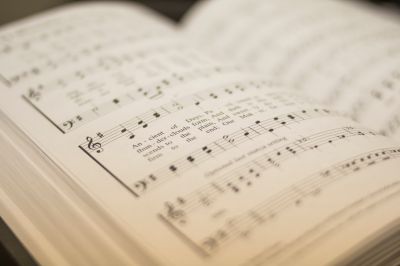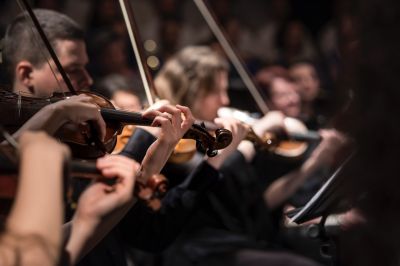What hymns are usually sung at weddings?
In traditional church weddings, hymns are a beloved part of the ceremony. They fill the church with joyful music and moving, sentimental lyrics.
Not only do they sound beautiful, but the meanings expressed in hymns are equally as potent. The songs thank God, celebrate the couple’s love and their happy future together.
Equally, if you’re not personally religious, but would still like to have a traditional wedding day, singing a selection of hymns is always a fun-filled and uplifting addition to the occasion.
If you’re struggling to create the perfect hymn list to accompany your wedding day, look no further - below, we’ve created a comprehensive guide to traditional wedding hymns. From the 30 most popular wedding hymns, to suggestions for modern alternatives, we’ve got everything you need to keep your day all things bright and beautiful. Hallelujah.
When in the ceremony are hymns usually sung?
For many couples, regardless of their religion, hymns are a popular addition to the ceremony because they’re a chance to get everyone involved.
As much as the guests can take part in the celebrations after the service, for the most part, the couple’s loved ones are asked to remain silent for the actual church service. Of course, this is understandable, but the addition of a few hymns invites everyone to partake in the day, and express their joy for the happy couple.
Typically, the couple will choose 2-3 hymns to be included in their wedding service.
Then, these are sung after the vicar welcomes the guests to the service, after the couple have signed the register, and then finally, before the priest gives the guests their blessing.
These hymns are either led by the vicar, the church organist, or by another professional musician (if you’ve hired one).
What are the most popular traditional wedding hymns?

As you can imagine, there are countless hymns out there.
Since the couple gets to choose the songs sung at their wedding, the hymns are one of the main opportunities for you to add your own personal touch to the ceremony.
We all want to get the song choices right, but spending hours researching hymns probably isn’t the top priority in your wedding planning to-do list.
So, to help you narrow down your search, we’ve listed 30 of the most popular traditional wedding hymns.
- Abide with me
- All things bright and beautiful
- Amazing grace
- And can it be
- Be still for the presence of the lord
- Be thou my vision
- Bind us together
- Bread of Heaven
- Fill your heart with joy and gladness
- Give me joy in my heart
- For the beauty of the Earth
- Give me joy in my heart
- Great is thy faithfulness
- In Christ alone
- Jerusalem
- Joyful, joyful we adore the
- Lead us heavenly father
- Light of the world
- Lord of the dance
- Love divine, all loves excelling
- Make me a channel of your peace
- Morning has broken
- One more step along the world I go
- Praise to the Lord, the Almighty
- Praise my soul the King of Heaven
- Shine Jesus shine
- Tell out my soul
- The grace of life is theirs
- To God be the glory
- We pledge to one another
Popular classical & instrumental music played at weddings

Popular pieces of classical, instrumental wedding music (often played when the couple are walking down the aisle, for example) also often feature during the ceremony.
Don’t worry, we’ve got you covered there too. The most popular classical religious music to be used in weddings include:
- Ave Maria
- Ave Verum Corpus
- Hallelujah Chorus
- Ode to Joy
- Wagner’s Bridal Chorus
Our top tips for choosing your wedding day hymns
- Choose familiar hymns with a strong tune and a repeated chorus - this will help encourage your guests to take part (even if they don’t know how the song goes!).
- Consider hiring a choir - although it’s an extra cost, a choir singing will not not only enhance the beauty of the music, but will also guide your guests through any less-familiar hymns.
- Ask your loved ones if they have any hymns that are special to them. For instance, choosing a grandparent’s favourite hymn adds an extra special touch to the service.
- Listen to different songs (BBC’s Songs of Praise is a great place to start) and make a list of your favourites. Choose songs that reflect your personality and the tone that you want to be created in your service.
- If you’re stuck for ideas, you could always ask the priest for recommendations!
Our favourite modern alternatives to wedding hymns
For whatever reason, if hymns aren’t quite the right fit for your ceremony, there’s absolutely no obligation to include them.
Although they are a wonderful choice for some, couples who are not religious may feel a bit uncomfortable about the idea of including hymns in their wedding service, or may find that the lyrics don’t resonate with them on a personal level.
And that’s absolutely fine! Remember, it’s your day, so don’t feel like you have to please anyone else.
It doesn’t matter whether your Great Aunt would prefer a more sombre and traditional hymn, choose music with lyrics that speak to you, and tunes that you take joy in singing along to - be they hymns or not.
If you like the tune of a hymn, but wouldn’t want it to be sung during your ceremony, you could always include an instrumental version of the hymn. If you hired a string quartet or another instrumentalist, then you could ask them to play that tune during your ceremony.
Or, if it’s the actual singing that you’re not sure about, then you could hire a church choir to sing the hymns for you. This will give the occasion a moving, traditional atmosphere, and the added bonus is that you know they’ll sing it beautifully!
Another option is a song that is not religious, either as a sing-along or an instrumental. Many churches do allow couples to include non-religious hymns at their wedding, but you’ll need to ask the priest for permission first.
Hymns are a wonderful way to bring personality and fun to your wedding day, while still retaining the powerful and emotive atmosphere that the ceremony achieves.
And, regardless of your beliefs, there’s nothing like a song to get everyone involved and put a smile on their faces.




